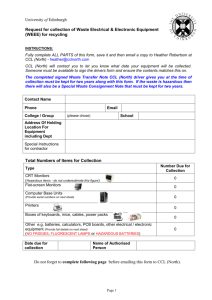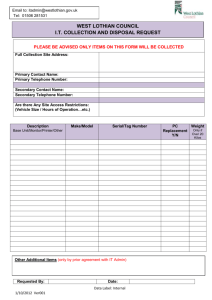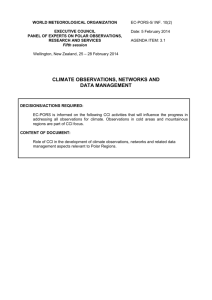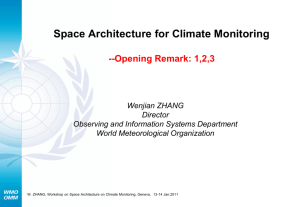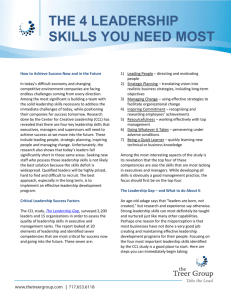Template Logo
advertisement
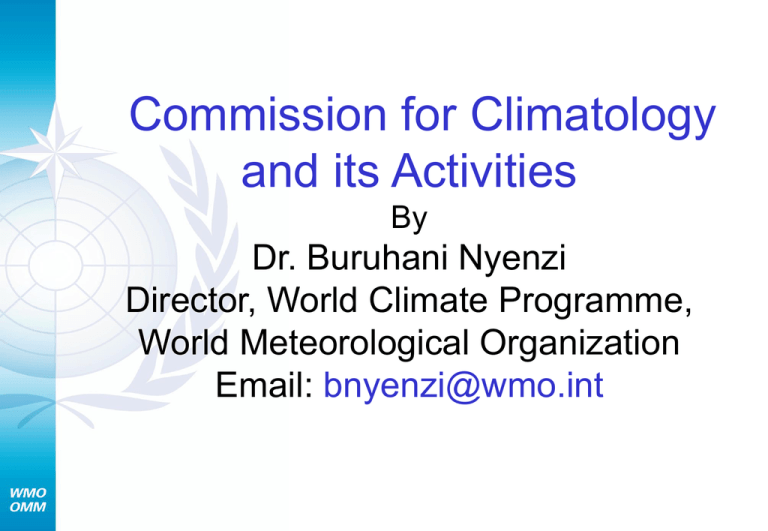
Commission for Climatology and its Activities By Dr. Buruhani Nyenzi Director, World Climate Programme, World Meteorological Organization Email: bnyenzi@wmo.int Commission for Climatology (CCl) • The structure of CCl • The Vision of the CCl • Experts serving under CCl? • The Management Group and ICT • The OPAGs and emerging priorities MANAGEMENT GROUP (MG) WMO COMMISSION FOR CLIMATOLOGY (CCl) President Vice-president Pierre Bessemoulin (France) Wang, Shourong (China) World Data Centres: Aleksandr Sterin (Russian Federation) OPAG 2 Monitoring and Analysis of Climate Variability and Change OPAG 3 Climate Information and Prediction Services (CLIPS) OPAG 4 Climate Applications and Services Chair: Raino Heino (Finland) Chair: Thomas Peterson (USA) Chair: Abdallah Mokssit (Morocco) Chair: Dong, Wenjie (China) Co-chair: Peter Ambenje (Kenya) Co-chair: Manola Brunet India (Spain) Co-chair: José Luis Santos (Ecuador) Co-chair: Muhammed Kadi (Algeria) 2.1: CCl/CLIVAR/JCOMM ET on Climate Change Detection and Indices CCl: Albert KleinTank (Netherlands) CLIVAR: TBD 3.1: ET on Research Needs for Intraseasonal, Seasonal & Interannual Prediction Jean-Pierre Ceron (France) 2.2: ET on Climate Monitoring including the use of Satellite and Marine Data and Products Zhang, Zuqiang (China) 3.2: ET on CLIPS Operations, Verification and Applications Services Operations: Philbert Tibaijuka (Tanzania) Verification: Simon Mason (USA) User Liaison: Jaakko Helminen (Finland) Regional Representatives: RA III: Luis Molion (Brazil) RA V: Michael Coughlan (Australia) OPAG 1 Climate Data and Data Management 1.1 ET for Climate Data Management including Metadata Radim Tolasz (Czech Republic) 1.2: ET on Observing Requirements and Standards for Climate William Wright (Australia) 1.3: ET on Rescue, Preservation and Digitization of Climate Records Joe Elms (USA) 2.3: Rapporteur on Climate Extremes Randall Cerveny (USA) Reporting to the President or Management Group: 5.1: Rapporteur on Climate–related Hazards (Member of the MG,TBD) 3.3: ET on El Niño and La Niña Luc Maitrepierre (New Caledonia) 3.4: Rapporteur on Climate And Water Nakaegawa Tosiyuki (Japan) 5.2: ET on the Guide to Climatological Practices (Ned Guttman, USA) 5.3: Gender Focal Point (Juliana Ukeje, Nigeria) 5.4: Rapporteur on GEOSS (Stephan Roesner, Germany) 7. Implementation/Coordination Team (ICT): CCl VP; Co-Chairs of OPAGs 1, 2, 3, 4; Chairpersons of the Working Groups on Climate-related Matters for RAs I, II, III, IV, V and VI. 4.1: ET on Climate and Health Glenn McGregor (UK) 4.2: ET on Climate and Energy TBD 4.3: ET on Climate and Tourism Dan Scott (Canada) 4.4: ET on Urban and Building Climatology Sue Grimmond (UK) Reporting to the OPAG Chairs: 6. CCl Experts serving on teams of other 3.5: Rapporteur on Climate and Agrometeorology Roger Stone (Australia) Technical Commissions OPAG: ET: Open Programme Area Group Expert Team WMO COMMISSION FOR CLIMATOLOGY (CCl) Regional Representatives: RA III: Luis Molion (Brazil) RA V: Michael Coughlan (Australia) President Vice-president Pierre Bessemoulin (France) Wang, Shourong (China) World Data Centres: Aleksandr Sterin (Russian Federation) OPAG 1 Climate Data and Data Management OPAG 2 Monitoring and Analysis of Climate Variability and Change OPAG 3 Climate Information and Prediction Services (CLIPS) OPAG 4 Climate Applications and Services Chair: Raino Heino (Finland) Chair: Thomas Peterson (USA) Chair: Abdallah Mokssit (Morocco) Chair: Dong, Wenjie (China) Co-chair: Peter Ambenje (Kenya) Co-chair: Manola Brunet India (Spain) Co-chair: José Luis Santos (Ecuador) Co-chair: Mohammed Kadi (Algeria) The Vision of CCl • To stimulate, understand and coordinate international technical activity to obtain and apply climate information and knowledge in support of sustainable development and socio-economic protection. CCl President • • • • Pierre Bessemoulin (France) Preside over sessions of the Commission Guide and coordinate the activities Carry out specific duties (PTC, EC-AGCE, ECAG-Evolving Role, POC-WCC3, etc.) • Reports to the Congress and EC • He is CCl’s public face • Leads the Management Group CCl Vice President • Wang Shourong (China) • Assists the president • Leads special projects at the president’s request • Chairs the Implementation and Coordination Team (ICT) Management Group (MG) • MG holds 3 inter-sessional meetings • Guides the Commission, involves strategic planning, evaluates the progress, • Members: • President& Vice-president • OPAG Chairs • Regional Representatives Implementation Coordination Team (ICT) • ICT Coordinates implementation of proposals • Liaise between CCl, RAs and the roles of Developing countries • Holds at least 1 meeting • Members: • Vice-President • Co-Chair of OPAGs • Chairs of RA WGs on Climate Matters OPAG 1 Climate Data and Data Management Chair: Raino Heino (Finland) Co-chair: Peter Ambenje (Kenya) 1.1 ET for Climate Data Management including Metadata Radim Tolasz (Czech Republic) 1.2: ET on Observing Requirements and Standards for Climate William Wright (Australia) 1.3: ET on Rescue, Preservation and Digitization of Climate Records Joe Elms (USA) Expert Team 1.1 on Climate Data Management including Metadata Priorities include: (a) (b) (c) (d) (e) (f) (g) (h) (i) Identify new requirements for CDMSs, Utilize computer/manual "in-service" systems Evaluate and install the next generation of CDMSs Determine the needs for migration from CLICOM system; Develop guidance on the management of climate data Provide guidance on the requirements for metadata, Establish standards for the exchange of metadata particularly WMO Information System (WIS); Coordinate and collaborate with other OPAG members, CBS, JCOMM, CIMO, GEOSS, GCOS, WCRP Explore the needs for capacity building Expert Team 1.2 on Observing Requirements and Standards for Climate Priorities include: (a) Ensure adequacy of observing instruments to meet in situ climate observation needs (b) Recommend procedures climate data homogeneity (c) Set basic standards of national and regional climate networks (d) Improve data exchange, particularly Reference Climate Stations, RBCN and the relevant GCOS networks; (e) Collaborate with the OPAG Rapporteurs, CBS, JCOMM, CIMO, GEOSS, GCOS and WCRP (f) Capacity building Expert Team 1.3 on the Rescue, Preservation and Digitization of Climate Records Priorities include: (a) Meet the needs of data users and data centres for data rescue (b) Investigate and document not digitized records in NMHSs (c) Explore synergies on climate data management across different regions; (d) Incorporate rescued data into long-term datasets; (f) Capacity building in each region, pertinent to data rescue OPAG 2 Monitoring and Analysis of Climate Variability and Change Chair: Thomas Peterson (USA) Co-chair: Manola Brunet India (Spain) 2.1: ET Joint CCl/Clivar/JCOMM on climate change detection and indices 2.2: ET Climate Monitoring including the use of satellite and marine data and products Zheng Zuqieng (China) Expert Team 2.1 Joint CCl/Clivar/JCOMM on climate change detection and indices Priorities include: (a) International collaboration on climate change detection (b) Use of indices of climate variability and change (c) Identify observations needs for climate change detection Guide on the provision of WMO climate System monitoring Contribute to generation of of optimized integrated satellite and in situ datasets in support of climate monitoring Identify needs in reanalysis data for monitoring climate variability and change Coordinate global extreme data records • • • • Expert Team 2.2 Climate Monitoring including the use of satellite and marine data and products Members Lead: Zheng Zuqieng (China) Experts: (TBD) 2.2: ET Climate Monitoring including the use of satellite and marine data and products Priorities include: (a) Advise on WMO annual Statement of the Climate (b) Contribute to optimized Satellite and in situ datasets (c) Coordinate with GCOS, GEOSS and WMO Space Programme (d) Identify global and regional needs for monitoring of climate variability (e) Create guidelines on verification of climate extremes (f) Establish feedback mechanism with satellite data OPAG 3: Climate Information and Prediction Services (CLIPS) Chair: Abdallah Mokssit (Morocco) Co-chair: José Luis Santos (Ecuador) 3.1: ET on Research Needs for Intraseasonal, Seasonal & Interannual Prediction Jean-Pierre Ceron (France) 3.2: ET on CLIPS Operations, Verification and Applications Services Overall lead: Philbert Tibaijuka (Tanzania) 3.3: ET on El Niño and La Niña Luc Maitrepierre (New Caledonia) 3.4: Rapporteur on Climate And Water Nakaegawa Tosiyuki (Japan) 3.5: Rapporteur on Climate and Agrometeorology Roger Stone (Australia) Expert Team 3.1 on Research Needs for Intraseasonal, Seasonal and Interannual Prediction, including the Application of these Predictions Members Lead: Jean-Pierre Ceron, France Experts: – – – – – – – Subramaniam Moten, Malaysia Paulo Nobre, Brazil Wassila Thaiw, U.S.A. Cherif Diop, Senegal Yun Wan-tae, Korea Jim Renwick, New Zealand Ose Tomoaki, Japan Expert Team 3.1 on Research Needs for Intraseasonal, Seasonal and Interannual Prediction, including the Application of these Predictions Priorities include: (a) Appraise current and future prediction systems (b) Review and improve methodologies for creation, and presentation to users, of prediction products (c) Assess relative value of dynamical downscaling methods against empirical methods (d) Promote IRI’s Climate Predictability Tool for applications (e) Recommend R&D activities for forecast systems, product presentation, applications and decision process support (f) Coordinate research needs with WCRP (g) Incorporate cross cutting themes (DPM, Space, LDCs) Expert Team 3.2 on CLIPS Operations, Verification and Application Services Members Operations co-lead: Philbert Tibaijuka,Tanzania Verification co-lead: Simon Mason, U.S.A. User Liaison co-lead: Jaakko Helminen, Finland Overall ET coordinator: Philbert Tibaijuka,Tanzania Experts: – – – – – Holger Meinke, Australia Matilde Rusticucci, Argentina Kanga Alphonse, Congo Gao Hui, China Vyacheslav Razuvaev, Russian Federation Expert Team 3.2 on CLIPS Operations, Verification and Application Services Priorities include: (a) Develop a strategy for implementation of research achievements for predictions, downscaling, multi-model ensembles (b) Develop a Guide on best operational practices in generation of climate information and prediction products (c) Develop verification techniques, run intercomparisons, and identify the requirements for RCCs, NMHSs and users for verifying information on climate predictions (deterministic and probabilistic) (d) Develop guidance on design and conduct of demonstration projects on cost/benefit analyses and value of climate information (e) Develop a Guide on best practices in user liaison (f) Complete update of TN 145 on ‘Socio-economic benefits of climatological Services’ (g) Incorporate cross cutting themes (DPM, Space, LDCs) Expert Team 3.3 on El Niño and La Niña Members Lead: Luc Maitrepierre, New Caledonia Experts: – – – – – – Vernon Kousky, U.S.A. Ravind Kumar, Fiji P. Booneeady, Mauritius Zhai, Panmao, China Humberto Enriquez, Ecuador Brett Mullan, New Zealand This ET supports development of WMO El Niño La Niña Updates Expert Team 3.3 on El Niño and La Niña Priorities include: (a) Develop strategy and common language for public communiqués on ENSO and develop Guidelines on improving collaboration on Predictions (b) Collaborate with WCRP WGSIP, GPCs, research institutes and the ET on research needs on the potential for development of an internationally uniform approach to communication on ENSO (c) Develop Guidelines on the interoperability between various definitions on El Niño and La Niña and their monitoring and impacts for EWS (d) Develop maps of El Niño and La Niña impacts for decision and policy makers (e) Incorporate cross cutting themes (DPM, Space, LDCs) Rapporteur 3.4 on Climate and Water Rapporteur 3.5 on Climate and Agriculture Rapporteur 3.4: Nakaegawa Tosiyuki, Japan (+ CCl Representative to WCP-Water Steering Committee) Rapporteur 3.5: Roger Stone, Australia Priorities include: (a) Build strong collaboration between CCl and CHY and CAgM (b) Develop joint training, workshops, publications (c) Assess the applicability of climate prediction and projection to water resource management and into agricultural production and food security systems (d) Incorporate cross cutting themes (DPM, Space, LDCs) OPAG 4: Climate Applications and Services Chair: Dong, Wenjie (China) ET 4.1: Expert TeamMuhammed on Climate Kadi and Health Co-chair: (Algeria) 4.1: ET on Climate and Health ET 4.2: Expert Team onMcGregor Climate and Energy Glenn (UK) 4.2:Team ET ononClimate ET 4.3: Expert Climateand andEnergy Tourism TBD ET 4.4: Expert Team on Urban and Building Climatology 4.3: ET on Climate and Tourism Dan Scott (Canada) 4.4: ET on Urban and Building Climatology Sue Grimmond (UK) Expert Team 4.1 on Climate and Health Members Lead: Glenn McGregor, UK Experts: – – – – – – Wing-mo Leung, Hong Kong, China Robin Hicks, Australia Ortiz Bulto, Cuba Ulisses Confalonieri, Brazil Larry Kalkstein, USA Abdelaziz Ouldbba, Morocco Expert Team 4.1 on Climate and Health Priorities include: (a) Investigate human reaction to environmental factors (b) WMO/WHO Guidelines on HHWS (c) Integrate HHWS into CLIPS operations, Climate Watch and DPM systems (d) ID health sector needs for climate information relevant to spread of infectious disease (e.g. malaria, avian influenza) (e) Develop tailored climate products for application to health (f) Build relevant partnerships (WHO, ISB, IAUC, PWS, GURME, etc.) and develop joint initiatives (g) Incorporate cross cutting themes (DPM, Space, LDCs) Expert Team 4.2 on Climate and Energy Members Lead: TBD Experts: – – – – – – – Zhu Rong, China Sandra Robles Gil, Mexico Samwel Marigi, Kenya David Wratt, New Zealand Franklin Ruiz, Colombia Elena Akentyeva, Russian Federation Dennis Elliott, USA Expert Team 4.2 on Climate and Energy Priorities include: (a) Develop case studies on application of climate information to energy operations (b) Improve climate services for energy development and operations (c) Report on climate data needs for wind and solar energy applications (d) Review training materials (e) Develop WMO TN on Meteorological Aspects of Utilization of Renewable Energy Sources (to replace TNs 172 and 175) (f) Develop partnerships with UNEP, WCIRP and others and develop joint initiatives (g) Develop tailored climate products for application to Energy (h) Incorporate cross cutting themes (DPM, Space, LDCs) Expert Team 4.3 on Climate and Tourism Members Lead: Daniel Scott, Canada Experts: – – – – – – Tanja Cegnar [alternate lead], Slovenia Mamina Camara, Senegal Roger Pulwarty, USA Mohammad H. Papoli Yazdi, Iran Susanne Becken, New Zealand Maximiliano Henriquez, Colombia Expert Team 4.3 on Climate and Tourism Priorities include: (a) Investigate statistical relationships between meteorological conditions and touristic frequentation and destination (b) Assess the impact of climate variability and climate change on the tourism industry, to support sustainable tourism (c) Investigate the impacts of the tourism business (air traffic, energy consumption, etc.) on climate (d) Develop, in partnership with the World Tourism Organization (WTO), NMHS climate services programmes, the WMO Regional Associations, and tourism professionals, tailored climate products for application to tourism (e) Develop information and methodologies for NMHSs in risk assessment (f) Investigate climato-therapy (g) Incorporate cross cutting themes (DPM, Space, LDCs) Expert Team 4.4 on Urban and Building Climatology Members Lead: Sue Grimmond, UK Experts: – – – – – – – – Tim Oke, Canada Dje K. Bernard, Côte d’Ivoire Song Lian Chun, China Ena Maria Jaimes Espinoza, Peru Bob Bornstein, U.S.A. AIldiko Dobi, Hungary TBD TBD Expert Team 4.4 on Urban and Building Climatology Priorities include: (a)Develop Guidelines on standardization of scientific communication on urban climate issues (b) Improve urban climate models (c) Assess the effect of urbanization on climate records (d) Build partnerships and improve communication (IAUC, CIB, IPCC, CBS, CAS, CHy, WCRP GEWEX) (e) WMO Technical Notes (f) Develop a training curriculum, hold regional workshops (g) Cost benefit analyses and demonstration projects (h) Incorporate cross cutting themes (DPM, Space, LDCs) Rapporteurs reporting to the President or Management Group: • Rapporteur on Climate–related Hazards ET on the • Guide to Climatological Practices • Gender Focal Point • Rapporteur on GEOSS • Implementation/Coordination Team (ICT): CCl VP; CoChairs of OPAGs 1, 2, 3, 4; Chairpersons of the Working Groups on Climate-related Matters for RAs I, II, III, IV, V and VI. Rapporteurs reporting to the President or Management Group: • CCl addresses the global Agenda • It involves voluntary experts from deferent part of the globe • World Climate Programme (WCP) supports its functioning • The structure is reviewed after every four years. Thank you for your Attention END
